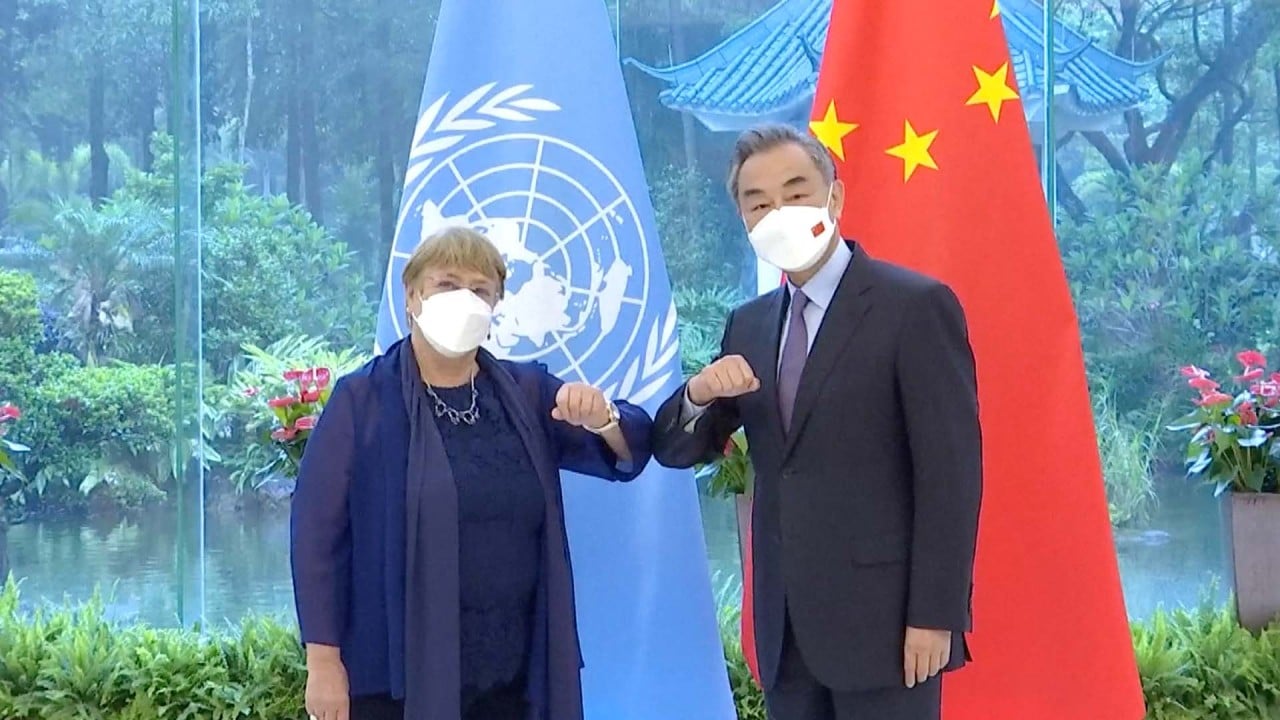
Germany, Britain and US press China over new ‘shocking’ Xinjiang human rights abuse reports
- State Department spokesman says US will work with allies to seek accountability after release of thousands of photos and documents from official Chinese databases
- Beijing says the material is ‘the newest example of a smear campaign by anti-China forces’
In a virtual meeting with Chinese Foreign Minister Wang Yi on Tuesday, German Foreign Minister Annalena Baerbock said there were “shocking reports and new evidence of very serious human rights violations in Xinjiang” and called for a transparent investigation.
“Human rights are a fundamental part of the international order and Germany is committed to protecting them worldwide,” Baerbock’s office quoted her as saying.
Her comments followed the release of a trove of alleged police documents and photographs appearing to shed new light on China’s internment of Uygurs and members of other ethnic minority groups – some allegedly as young as 15 years old.
US State Department spokesman Ned Price said the US administration was “appalled” by the “jarring images” and would continue to work with allies to seek accountability for the Chinese government’s actions in Xinjiang.
“The United Kingdom stands with our international partners in calling out China’s appalling persecution of Uygur Muslims and other minorities. We remain committed to holding China to account,” she said.
Condemnation from the three countries came after academic Adrian Zenz published thousands of police photos and official documents from Xinjiang, sent to him by an anonymous source who allegedly hacked into official databases.
Photographs of those detained included that of a 15-year-old girl and of an older woman placed under suspicion because her son showed “strong religious leanings” by abstaining from alcohol and cigarettes, according to a BBC report on the files.
US and EU vow coordinated tech standards to counter China’s rising influence
At a briefing on Tuesday, Price would not weigh in specifically on whether the State Department assessed that the chain of command for the camps ran all the way to Xi.
“But I will just say in a system like the PRC’s, it would be very difficult to imagine that a systemic effort to suppress, to detain, to conduct a campaign of genocide and crimes against humanity would not have the blessing, would not have the approval of the highest levels of the PRC government,” Price said.
The Chinese embassy in Washington did not answer questions about Price’s assertion. But in a statement, embassy spokesman Liu Pengyu accused the US of having “repeatedly used Xinjiang-related rumours to stir up trouble”.
“The US is engaged in political manipulation under the guise of human rights, in an attempt to undermine the prosperity and stability of Xinjiang and curb China’s development,” Liu said.
China has faced international criticism over alleged forced labour and genocide of members of the Uygur community and other mostly Muslim minorities in detention centres and prisons across Xinjiang. Beijing has repeatedly denied these allegations.
Alluding to the police documents, Franziska Brantner, state secretary at Germany’s federal ministry for economic affairs and climate action, said on Tuesday that the country’s China policy “must change”.
“Appeasement for [economic] interests is no strategy,” she said in a tweet.
On Tuesday, Chinese foreign ministry spokesman Wang Wenbin said the material including photos of captives at re-education centres in Xinjiang represented “the newest example of a smear campaign by anti-China forces”.
“Spreading lies and rumours cannot deceive the world, nor can it cover up the fact that Xinjiang is peaceful and stable,” he said.
Top Chinese official says all ethnic groups in Xinjiang are happy
Those arguments are unlikely to find a sympathetic audience in Washington, where US lawmakers said on Tuesday that the alleged police documents indicated that Muslims in Xinjiang were being targeted because of their cultural and religious identity rather than over specific criminal actions.
In a statement, Senator Jeff Merkley, Democrat of Oregon, and Representative James McGovern, Democrat of Massachusetts, urged Bachelet “to confront Chinese officials with the evidence presented by these leaked documents” during her visit to Xinjiang this week.
Bachelet arrived in China on Monday for a six-day trip – the first to the country by a UN human rights commissioner since 2005.
Her tour, which reporters will not be permitted to trail, has elicited criticism from the US and rights groups. They believe she will not be given adequate access to sites in Xinjiang to build a thorough picture of the rights situation there.
On Tuesday, Price said the US believed it was a “mistake” for Bachelet to have agreed to the visit under those circumstances.
Bachelet conducted virtual meetings with around 100 mostly Beijing-based diplomats on Monday during which she was reported by Bloomberg to have said that the trip should not be seen as an “investigation”.
But diplomatic sources in Beijing reportedly said the commissioner gave assurances over her access to detention centres and rights defenders in China. She is expected to visit the Xinjiang cities of Kashgar and Urumqi.
He also stressed that China “made the protection of citizens’ legitimate rights and interests its basic task”, adding that “safeguarding the rights of ethnic minorities was an important part of its work”.

.jpg?itok=H5_PTCSf&v=1700020945)


